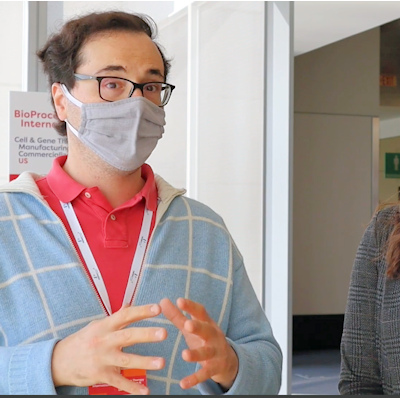October 4, 2021 -- SQZ Biotech is working to bring cell therapies to patients' bedsides by using high-throughput technology that temporarily opens the cell membrane by squeezing cells through a microfluidic chip for the delivery of biologic materials into cells, thus enabling the creation of various novel cell therapy products. Founder and CEO Armon Sharei, PhD, spoke with ScienceBoard.net recently at Biotech Week Boston 2021.
The cell is a complex molecular machine and has capabilities that current therapeutics -- such as small-molecule drugs or biologics -- simply do not possess. By delivering new materials into cells, SQZ Biotech has been able to unlock potential new therapeutic applications, Sharei said. In addition, according to Sharei, the company's technology can be easily integrated with other equipment for cell therapy manufacturing.
The company was founded in 2013 based on technology that Sharei developed during his graduate work at the Massachusetts Institute of Technology. The technology can deliver various payloads into cells and enables the manufacturing of cell therapy products in under 24 hours. This makes cell therapies more practical, Sharei said.
Last week at Biotech Week Boston 2021, Sharei presented in a session titled "Let's Settle the Debate -- Can Auto and Allo Therapies Coexist?" The main challenges facing the cell therapy industry today are, one, the complicated nature of processes involved in manufacturing products and, two, manufacturing scalability, Sharei said.
SQZ Biotech is addressing these issues with its integrated technology that can help expedite and simplify the cell therapy manufacturing process, as well as reduce the costs involved, Sharei noted. With its platform, the company pursues biologics that are not inherent to the cells, but which are required to be effective therapeutics. Sharei's vision is that a patient would have cells extracted at a hospital, which would then be put through a machine to generate a cell therapy, and within 24 hours, the cells would be readministered to the patient.
In terms of which cell therapy approach will win in the end, Sharei said that he believes that autologous cell therapies will probably have a primary role because they have more biological advantages, whereas the main advantage of allogeneic therapies is that they are currently cheaper to produce. However, if an autologous cell therapy can be produced onsite, it can become much more practical as a first or early therapeutic option rather than as a last resort, Sharei said.
SQZ Biotech is currently applying its technology to produce therapeutic candidates in the oncology, immune tolerance, and infectious diseases spaces.
Copyright © 2021 scienceboard.net








